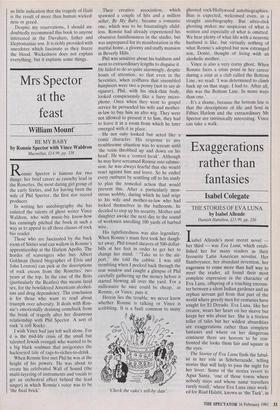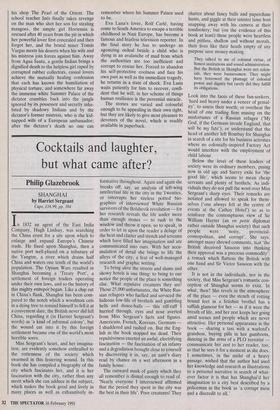Exaggerations rather than fantasies
Isabel Colegate
THE STORIES OF EVA LUNA by Isabel Allende Hamish Hamilton, £13.99, pp. 250 Isabel Allende's most recent novel — her third — was Eva Luna, which estab- lished her for many readers as their favourite Latin American novelist. Her flamboyance, her abundant invention, her eagerness to come more than half way to meet the reader, all found their most complete expression in the character of Eva Luna, offspring of a touching encoun- ter between a silent Indian gardener and an orphan servant girl from that part of the world where greedy men for centuries have sought for El Dorado. Eva Luna, like her creator, wears her heart on her sleeve but keeps her wits about her. She is a tireless teller of tales but her wildest absurdities are exaggerations rather than complete fantasies and where on her dangerous continent there are horrors to be con- fronted she looks them fair and square in the eyes.
The Stories of Eva Luna finds the fabul- ist in her role as Scheherazade, telling stories that will help to pass the night for her lover. Some of the stories revert to Agua Santa, 'one of those towns where nobody stays and whose name travellers rarely recall,' where Eva Luna once work- ed for Riad Halabi, known as 'the Turk', in his shop The Pearl of the Orient. The school teacher Ines finally takes revenge on the man who shot her son for stealing mangoes, the simple girl Hortensia is rescued after 40 years from the pit in which her powerful lover first concealed and then forgot her, and the brutal miser Tomas Vargas meets his deserts when his wife and his mistress join forces against him. Away from Agua Santa, a gentle Indian brings a dignified death to the helpless girl raped by corrupted rubber collectors, casual lovers achieve the mutually healing confession that each has known the humiliation of physical torture, and somewhere far away the immense white Summer Palace of the dictator crumbles back into the jungle ignored by its possessor and secretly inha- bited by shadowy Indians and by the dictator's former mistress, who is the kid- napped wife of a European ambassador; after the dictator's death no one can remember where his Summer Palace used to be.
Eva Luna's lover, Rolf Carle, having come to South America to escape a terrible childhood in Nazi Europe, has become a famous and fearless television reporter. In the final story he has to undergo an agonizing ordeal beside a child who is dying in an avalanche of mud from which the authorities are too inefficient and corrupt to rescue her. Forced to abandon his self-protective coolness and face his own past as well as the immediate tragedy, he returns in a state of shock. Eva Luna waits patiently for him to recover, confi- dent that he will; in her scheme of things human resilience is the perennial miracle.
The stories are varied and colourful enough to be appealing in their own right, but they are likely to give most pleasure to devotees of the novel, which is readily available in paperback.



















































 Previous page
Previous page